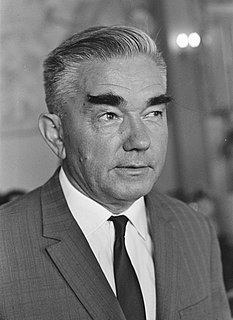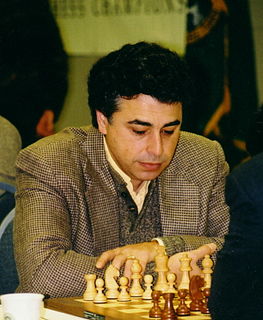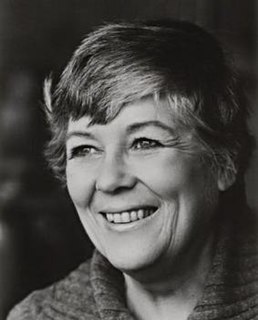A Quote by Alexander Kotov
The placing of the centre pawns determines the "topography" of a game of chess.
Quote Topics
Related Quotes
He hated games they made the world look too simple. Chess, in particular, had always annoyed him. It was the dumb way the pawns went off and slaughtered their fellow pawns while the king lounged about doing nothing. If only the pawns would've united ... the whole board could've been a republic in about a dozen moves.
Chess is more than a game or a mental training. It is a distinct attainment. I have always regarded the playing of chess and the accomplishment of a good game as an art, and something to be admired no less than an artist's canvas or the product of a sculptor's chisel. Chess is a mental diversion rather than a game. It is both artistic and scientific.
I love chess, and I didn't invent Fischerandom chess to destroy chess. I invented Fischerandom chess to keep chess going. Because I consider the old chess is dying, it really is dead. A lot of people have come up with other rules of chess-type games, with 10x8 boards, new pieces, and all kinds of things. I'm really not interested in that. I want to keep the old chess flavor. I want to keep the old chess game. But just making a change so the starting positions are mixed, so it's not degenerated down to memorisation and prearrangement like it is today.
American democracy is a chess-game in which pawns imagine themselves to be free individuals with wills of their own: that delusion is one of the rules of the game, without which the game could not continue. I doubt anyone, no matter how sharp and sharp-tongued, could succeed in getting across to high school students how vital an acute mind is for just keeping a grip on one's life and earnings in our mendacious politics and economics. No wonder our school system is devoutly dedicated to demoralizing and blunting such minds.
Chess holds deep wisdoms of the people. It is truly an image of life, the reflection of human fate that has shown us the earthly way of suffering in darkness and permanent shortage of time. Like in chess, we encounter all kinds of traps, mistakes, settlements, sacrifices, kings, and queens, doubled pawns, and extraordinary moves while we are on the board ourselves.
I used to play a lot of chess and competitive chess and study chess and as you get to the grandmasters and learn their styles when you start copying their games like the way they express themselves through... The way Kasparov or Bobby Fischer expresses themselves through a game of chess is it's astonishing. You can show a chess master one of their games and they'll say "Yeah, that is done by that player."
War is like a game of chess ... but with this little difference, that in chess you may think over each move as long as you please and are not limited for time, and with this difference too, that a knight is always stronger than a pawn, and two pawns are always stronger than one, while in war a battalion is sometimes stronger than a division and sometimes weaker than a company. The relative strength of bodies of troops can never be known to anyone.... Success never depends, and never will depend, on position, or equipment, or even on numbers, and least of all on position.
I started playing chess when I was about 4 or 5 years old. It is very good for children to learn to play chess, because it helps them to develop their mental abilities. It also helps to consolidate a person's character, because as it happens both in life and in a chess game we have to make decisions constantly. In chess there is no luck and no excuses: everything is in your hands.
All experiments that are related to the games when you have humans versus machines in the games - whether it's chess or "Go" or any other game - machines will prevail not because they can solve the game. Chess is mathematically unsolvable. But at the end of the day, the machine doesn't have to solve the game. The machine has to win the game. And to win the game, it just has to make fewer mistakes than humans. Which is not that difficult since humans are humans and vulnerable, and we don't have the same steady hand as the computer.


































